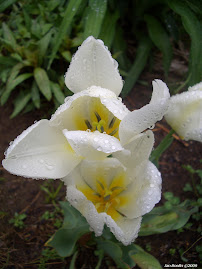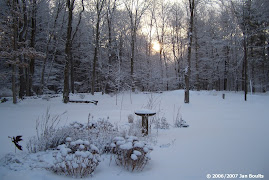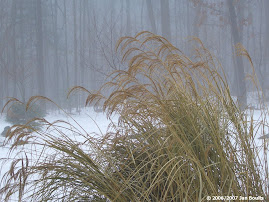Death Lingers
The process continues
As Death lingers
Tears keep falling.
First holidays are the hardest
Without you here.
We stumble, we blindly step
Into your shoes that do not fit any of us.
We go about what you would do
Although it is never quite the same.
Numbness has set in
Where your love should be,
You are free now
We are prisoners of pain.
Mother's Day, May 14, 1995
Generation of Mothers
Your day came, Mother,
As I knew it would
Never thought I’d be
A visitor at your grave.
Today, alone, afraid at home
I dug deep in the earth
Hammering the soil
Beating the ground
Tossing rocks
Cutting trees
To give you a garden –
My gift this Mother’s Day.
I thought of all the women
Gone before me
As I tended to my flowers,
I praise that generation of Mothers
That helped you to know
How to nurture and to love me.
July 4, 1995
My Enlightenment
On the last day of December
The old gave way,
To the patterns of change
New adjustments, beginnings
Time for reminiscing.
This is the year of my enlightenment,
The year of loss,
The year of sorrow.
This is the year I turned gray
The year we suffered, Mother
The year I aged.
Dad's Birthday, July 7, 1995
Henry
Forces that connect
Hold us very still
Within our separate realms
To rise above and lift
Hearts to the acceptance of pain
Again
Intertwined generations
Roll, clash, and suffer
Alone thoughts stir and melt
Hot tears of lost tomorrows.
July 8, 1995
Dance Away
Could not have guessed
At your day of death
How very much I would unravel
With a blur of visions, rush of memories
Swiftly speed ahead
Then rapidly lose each moment.
I tried so hard to be strong Mom
While all along this year we mourned
Those special days.
The summer is heavy with cobwebs and dust
That clings and cloaks the mind,
I try to travel in tiny steps
So I can dance away this time.
July 13, 1995
Faces of Grief
All around the world moves
While someone has fallen,
A broken piece is missing.
We cannot brush off,
Uncover, reveal
The truths now hidden in a grave.
Ashes to ashes, and what remains
Are the faces of grief
Trapped in a year of mourning.
These new roles have been delivered
Wrapped so tight with pain
There will be no adjustment, ever.
When we buried your heart
We slit ours wide open.
August 1, 1995
Farewell Home
Unusual connections landed me
At the old Cook Homestead for a week
A turn of fate, twisted enough to matter.
It was summer, sticky and sweet.
My old room – Mom’s room at the end
Where teenage rebellion echoes off the walls,
Maturing woman’s fears hover near the door
And a lost soul collapses under the bed.
Fallen angels call,
They whisper endearments in my head
Upon that chipped, forlorn front porch
I sit with Father and listen.
The day is long, our words are quiet
Silences are comfortable.
We miss her together, feel the newness of loss
In a simple reminder of what she would have said,
Or done, her laughter gone.
This is my farewell to your home, Mother
A reprieve in a moment of time.
To let go, to shine, smile
And say goodbye.
August 3, 1995
The Cook House
I have come to love and understand
This big house and all its old glory.
Feeling the presence of my past,
The generations, the stories.
In darkness I roam the hallways,
Steal down steep or winding stairs,
Step out on a porch to a starry night
Ink black sky, heavy heat cloaks the air.
History is long, straight in this place,
Heirlooms and ghosts hidden in closets
Seep out an aura of days lost.
Time in each family has folded
Slipped away, old to new adjustments, change.
Connections of blood are relived, reborn
I have come to appreciate my forefathers,
The women, their era, who have all gone,
Leaving the wisdom to grow alone.
Great Grandpa Cook’s plan
Drawn up, measured out, cash in hand,
Created my childhood home,
And all the best of memories
One could ever dream
Continue to live on.
August 20, 1995
Day of My Birth
You who gave me life
Are dead
On this day of my birth
Parent creator
I still need you.
Cheated out of time instead
Walking that thin sharp line
I cannot hold this pain inside
The hour grows dim with tears
Dull pain throbs, I know
That today
I feel your absence the most.
August 20, 1995
Last Moments
That winter day was bright
Laughing together
In our last moments with you.
At dawn your life ended
Just like that –
You were gone.
Abruptly a new year began
Shock set in along
Cracks in my heart
Sorrow became my make-up.
Memories replay in my head
Over and over I see you
Letting go, and your voice
Repeats to me your message
That I would have to be strong.
September 6, 1995
Wait, Watch, Listen
Mom, oh Mommy!
Devastation, depression
Intense sadness fills
Days of frustration.
Why you do not come to me
At my hour of need
Ticking, trickling
I wait, I watch, I listen
For the sound of you
The feel of you.
Your guidance, calm patience,
The smile I miss.
Words are absent, your spirit silent.
I just cannot hold on
Mom, oh Mommy!
September 21, 1995, Gramma Cook's Birthday
Without a Mother
Today was your mothers’ birthday
You did not live long
After her death
It was never the same for you.
I am third generation
From your mother,
Not a birthmother
Now without a mother.
You took your own life
To slowly die
My parent, partner, friend
Wait
For the circle to close again.
September 23, 1995
Autumn Colors
Autumn colors my world
Gentle hues turn the season
Turn the time
Change my life.
Brisk cold air lingers
In the early morning hour
A chill sets into my soul
No warmth can erase.
September 30, 1995
Just Like You
Today I saw your childhood friend,
It made me cry
While we discussed your life
And how suddenly you died.
She told me that I look
Just like you
Something I have heard
Many times
In this long year of mourning.
October 1, 1995
New Fall
I walked through your garden today
Filled with a rainbow of autumn
The one I struggled to build
All those cold spring mornings.
My grief in that Mother’s Day gift
Has grown through a process
That began with shocked
Selfish possession
Of your precious memory
The harsh reality
Sets in and I will not see
Your beautiful face again.
On earth, in the soil of this garden
Tears bitter and sweet
Have mixed with the dust.
Watch now as the late sun
Reaches long fingers
Across the lawn
And with every glorious color
That I tread upon
I miss you.
November 1, 1995
Frozen Ground
Flurries in the air
Dark sky, fresh sting
Winter on the rise
Snow brings
A memory of the frozen ground
And the circle all around
Your grave
Trying to be brave, we stood numb
Bitter cold, burying your soul
With no sense to make
Of the depth of that day.
December 31, 1995
A Year of Mourning
My heartache is renewed by a fresh pierce of pain
How will we ever face Christmas without you?
The season holds precious memories
This time is the hardest of all.
We will miss you more
Than one could imagine
As we approach the final stage
Of our first year of mourning.
January saw our tree slowly dying
As it lay neglected on the porch
Something you were spared
Your death not comprehensible.
Spring brought me daffodils from bulbs
You gave me that very last fall,
When they appeared, I cried out loud
And lay down in all that golden glory.
Mother's day shattered my emotions
While pounding the ground for your garden
A gift that would help to heal my soul.
Summer was long and steamy
I spent a week wandering
Old halls, calling for your ghost.
Autumn brought splendid colors
Sprinkled throughout my yard
I found I could not cope, it was just too hard.
Winter came with a sudden burst
Brilliant snow white, shining clear
That made me hurt for that last day
Of your last year on Earth.
New Year's Eve descended, suddenly we were there
The anniversary of your death
We did not hurt any less
At the end of this year of mourning.
~~**~~ ~~**~~
Blessed are they that mourn:
For they shall be comforted.
Matthew 5:4


















.jpg)





 Writing poetry was not enough to financially sustain a family. From 1816 to 1825, he practiced law in
Writing poetry was not enough to financially sustain a family. From 1816 to 1825, he practiced law in 













